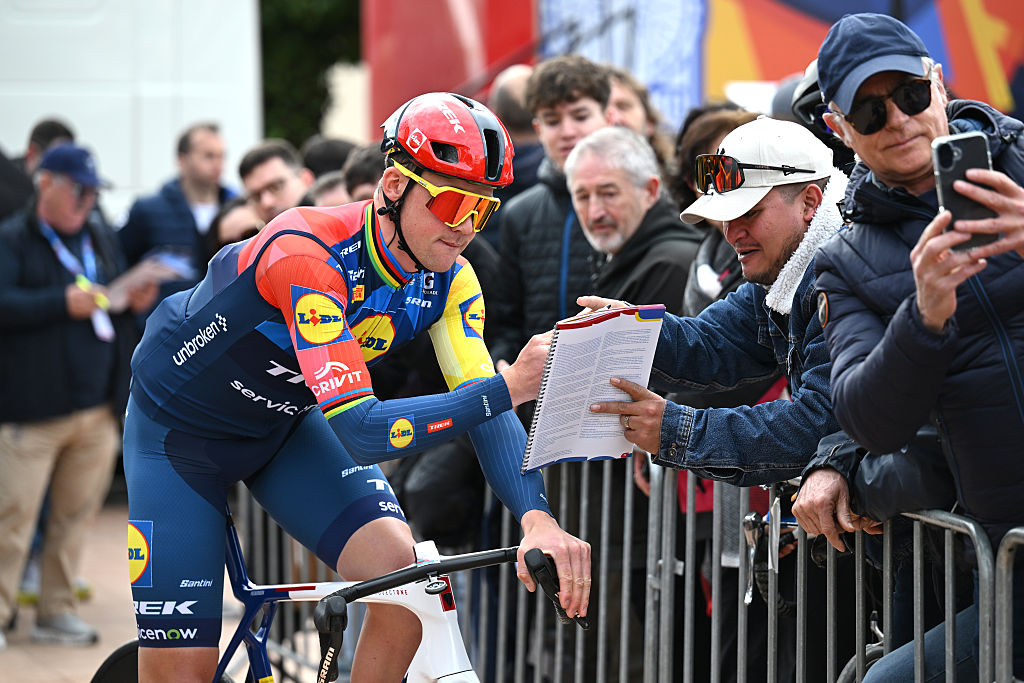Pole vault and Tadej Pogačar – Why the World Champion's dominance at Critérium du Dauphiné or the Tour de France is a privilege to watch, not boring
From the importance of underdogs to Vingegaard and Van der Poel balancing the powers, competitive racing is more exciting, but elite sport needs periods of supremacy
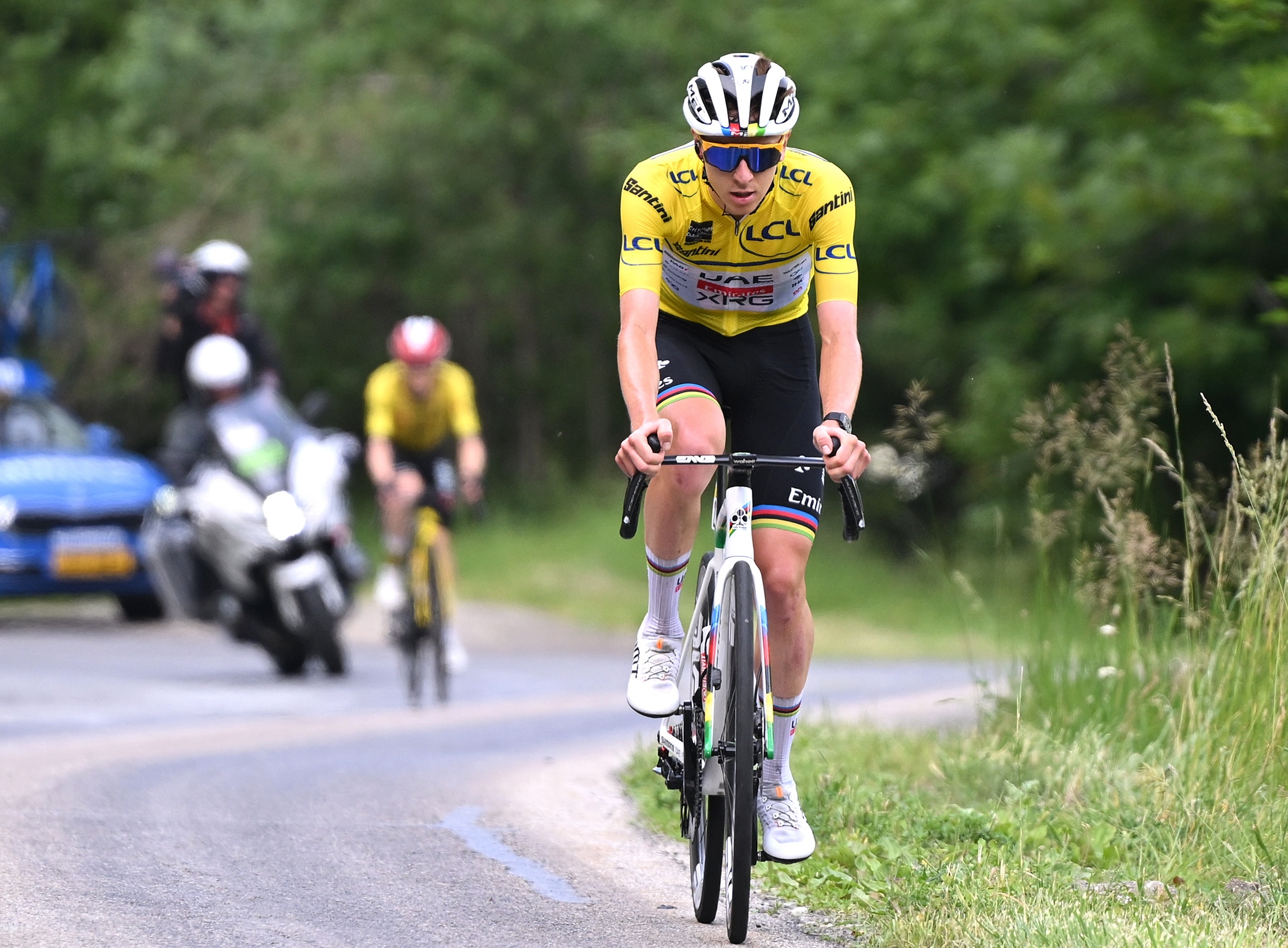
The latest race content, interviews, features, reviews and expert buying guides, direct to your inbox!
You are now subscribed
Your newsletter sign-up was successful
It's Sunday evening, and what am I doing? Watching pole vault. A seriously specific event, yes, and one that could often be avoided as a spectacle, especially for a routine meeting of the Diamond League, but with Mondo Duplantis in action, it offers a rare opportunity to watch the best athlete ever in their sport compete today.
Yes, I know he is going to win. I also know he is probably going to break the world record again. I'll save you the wait – he did, for a 12th time – but yet, mine and everyone in the Stockholm Olympic Stadium's eyes were glued on him successfully clearing 6.28m, 38cm higher than second-place.
Is the lack of competition boring to me? Of course not… he's so dominant that I've started watching pole vault of all things. Granted, the 1cm incremental jumps are for a financial incentive each time he breaks his own world record, but being the entertainer he is, I can't help but keep coming back.
Now it's obviously hard to compare such a specific track and field event to the drawn-out, nuanced battles of professional road cycling, but I at least have a similar feeling watching Tadej Pogačar that I do to Duplantis - that I'm watching the best ever. It's perhaps fitting that the latter beat the former, and several other sporting superstars, to the Laureus Sportsman of the Year award for 2024, even despite Pogačar's historic Triple Crown triumph of the Giro d'Italia, Tour de France and World Championships.
Now, was I as certain that Pogačar was going to win the Critérium du Dauphiné as Duplantis on Sunday? No, especially after the stage 4 time trial, where he suffered big losses to both Remco Evenepoel and Jonas Vingegaard. That changed after stage 6, of course, when he dominated the route to Combloux and put a minute into main Tour de France rival Vingegaard on such a short climbing effort, ending the GC race with an anti-climactic seated surge.
I'm not bored, though, as many seem to be after watching the World Champion ride solo to the finish again and again, despite the final weekend of mountain stages seeing Pogačar seemingly ease to overall victory at the Dauphiné.
While at the same time, I'm not going to push that "you're watching greatness, just enjoy it" sentiment onto you, I can't help but feel that excellence, and with it dominance, is the "raison d'être of elite sport", as I read it described when looking into discourse around trainer Willie Mullins' domination of horse racing.
The latest race content, interviews, features, reviews and expert buying guides, direct to your inbox!
If not for the superstars, then underdog wins wouldn't mean as much. Pogačar rarely loses, and that can make racing predictable, but he is the pinnacle. So, when he does come unstuck, it makes it all the more exciting.
I've only been a cycling journalist in the Pogačar era, and my two favourite days working on races, not reporting on the ground, have been stage 11 of the Tour de France in 2024 and Amstel Gold Race this season. Both saw the seemingly infallible Pogačar blast away in one of his typical solo moves that usually end a race at his discretion, but both saw him get chased down and outsprinted to the victory.
It was Vingegaard who managed it at the Tour, with fueling mistakes from Pogačar seeing the Dane take an emotional win, and Mattias Skjelmose in the Dutch Classic, thanks to monster work from Evenepoel to chase down the rainbow jersey.
For me, Pogačar's failure to convert brought feelings akin to that of watching an undefeated boxer losing their '0' in shock fashion. Think back to Mike Tyson falling to Buster Douglas in 1990, or Anthony Joshua tasting his first defeat at the hands of replacement and huge underdog Andy Ruiz in 2019, for a more recent, less significant example.
Pogačar's air of invincibility is just as important to his legacy as his humble personality, as the key to unlocking shocking defeats when they do emerge. Even the time trial was a big surprise, obviously not that he didn't beat the Olympic and World champion in the discipline, Evenepoel, but that his margin of defeat was so big over only 17km – 48 seconds.
Enjoying the dominance
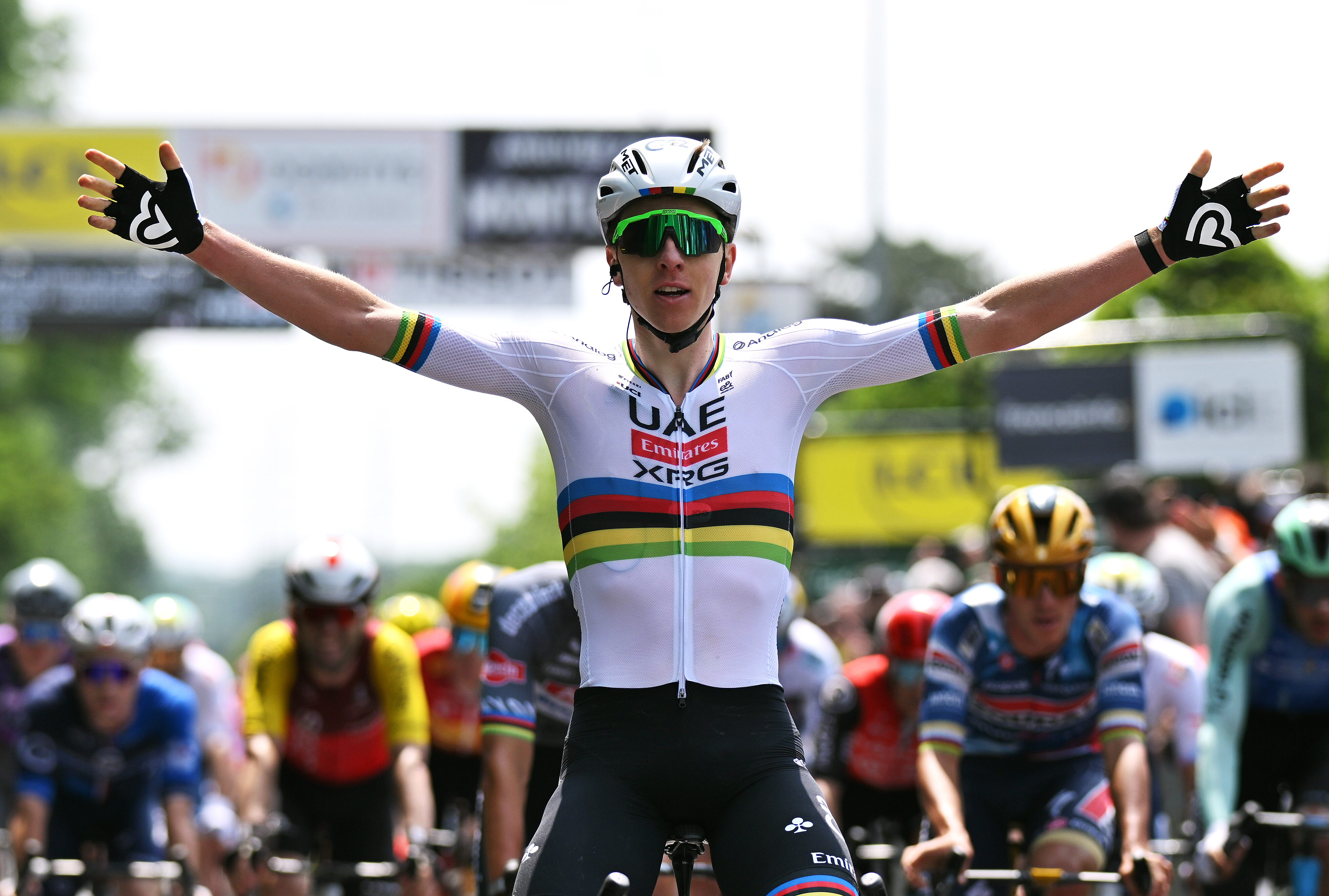
Even when he's at his dominant best, though, it feels like more of a privilege to me, to be working and writing about the best rider since Eddy Merckx, with no real feeling of what it must have been like watching the Cannibal feast on any and every race back in the late 60s and 70s.
I don't find it boring seeing him off the front for as long as he is. That may come from my general view of sport being about seeing the best, but from him dropping back to fetch his only support rider Pavel Sivakov a bottle before the final climb on stage 7 of the Dauphiné, or him allowing Vingegaard to come past him for second on stage 8, Pogačar in total, supreme control of a race is unmissable.
He's able to do whatever he wants, at will. For someone who grew up with Messi and Ronaldo in football, Bolt in athletics and Federer, Nadal and Djokovic in tennis, that absolute peak of dominance is part of what draws me into the sports themselves.
That control, to me, took the form of subtle mind games for Pogačar, with the Tour approaching quickly. Him dropping back for that bottle is the type of flex that reminded me of the Plateau de Beille stage of last year's Tour, when he took his hands off the bars and emptied a bidon over his head 10km from the finish, before responding to all of Vingegaard's attacks and dropping him to win solo in one of his best-ever performances..
After the TT, he laid down a statement with the win on stage 6, but that was enough bravado for one week, with his stage 7 victory being much more low-key, and the final day looking like a Sunday training ride. It's not often a rider can choose when his 100th pro win arrives, just ask Alexander Kristoff, but Pogačar looks set to have that milestone arrive at the Tour after allowing Lenny Martínez and the break to succeed on Sunday as he moved to 99, not out.
Golden era
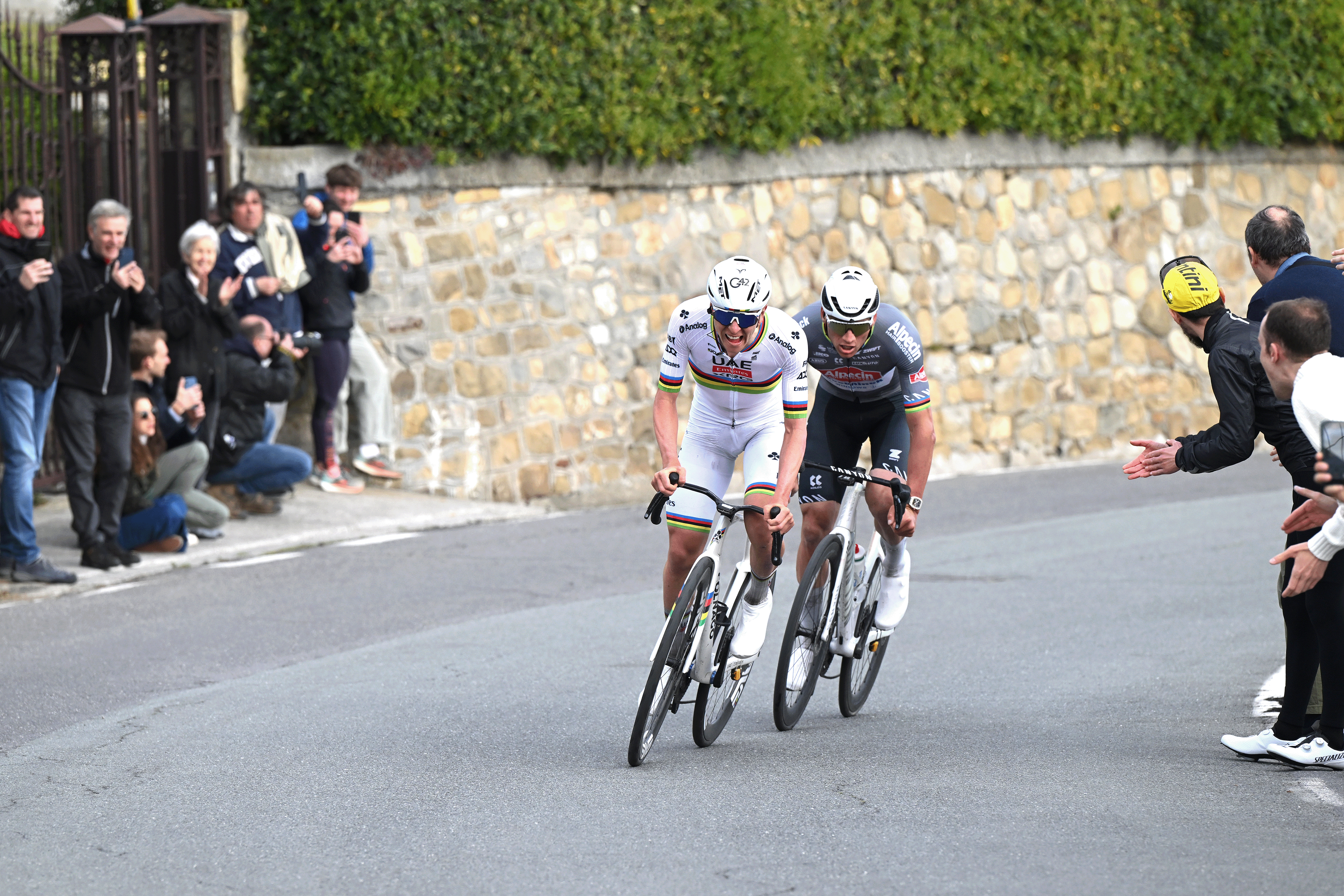
The question of Pogačar making cycling 'boring' with his dominance is one that has followed him ever since it became clear he was the best we'd seen since Bernard Hinault and Merckx of yesteryear, producing the all-round calendar supremacy that was a dying art in the 2010s. And it will follow him until a successor emerges, or he retires.
But it's a unique time for the sport in this golden era of superstars led by Pogačar. With Mathieu van der Poel also present, the balance of powers in the Classics is maintained – all of San Remo, Flanders and Roubaix in 2025 more than proved that. But without Vingegaard, too, his legacy is nowhere near as enthralling. Let's not forget that the 2024 Tour was a bounce-back win for the Slovenian, who in 2022 and 2023 was well beaten by the Dane at the Tour.
Now, with Pogačar addressing his limited weaknesses of old – which could have been seen as struggles at high altitude or in the heat – shown in his destruction of the Pyrenees last year, and big crashes and time out with injury for Vingegaard in the past two seasons, the balanace has swung back massively in Pogačar's favour. And the Dauphiné suggests it is going to stay that way.
Even his newer seated style of attacking is one sign of constant evolution from Pogačar, looking always to move clear of his rival.
So this begs the question, how did Vingegaard ever beat Pogačar when the gap between the two appears now insurmountable?
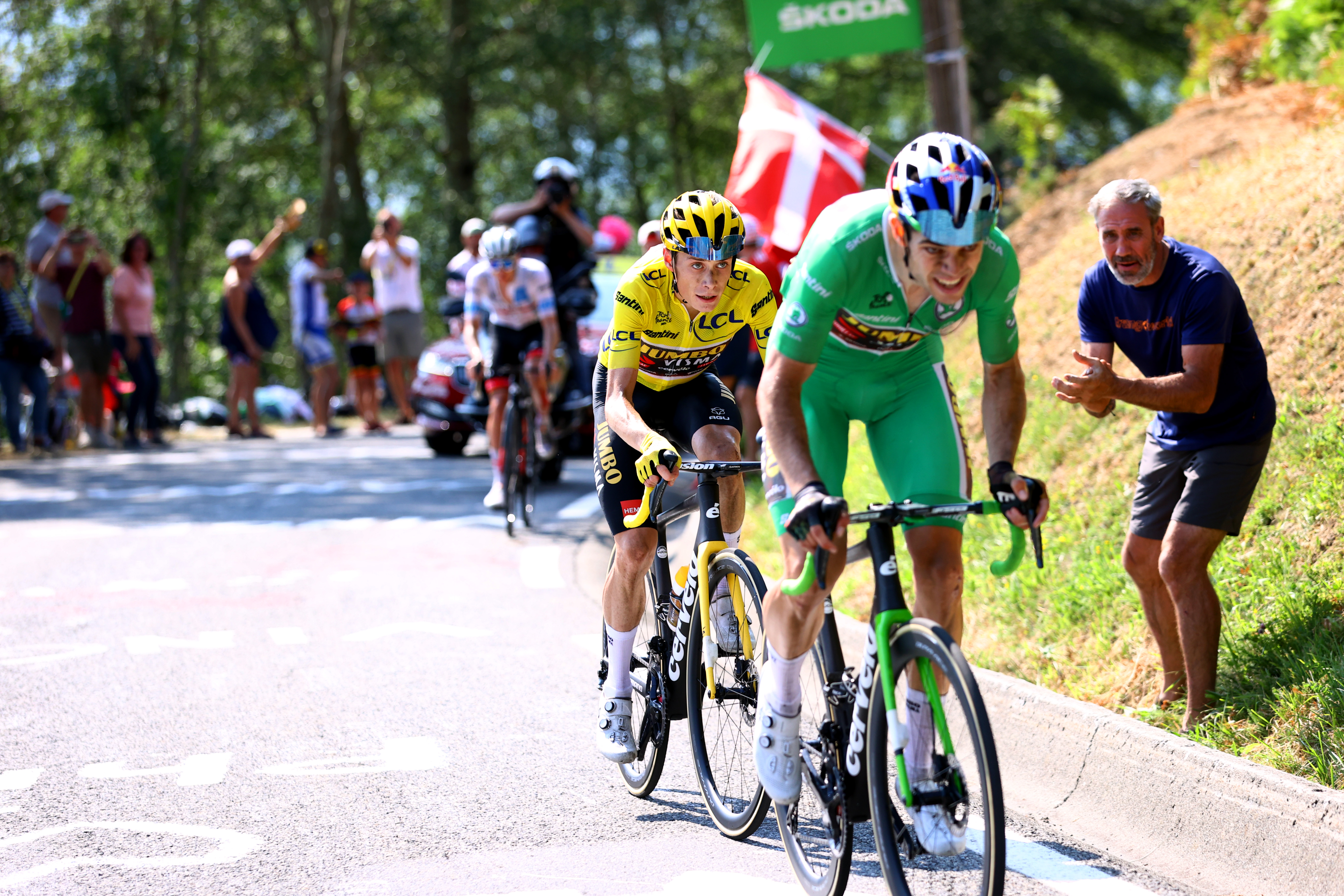
Looking back, it was of course Visma-Lease a Bike's team masterclass on the road to the Col du Granon that dealt the main blow in 2022, with Vingegaard following that on the Hautacam to complete the job.
The year after, while Pogačar famously stating "I'm gone, I'm dead" on the lower slopes of the Col de la Loze is remembered more as the moment that Tour ended, it was on the time trial one day earlier that Vingegaard surely broke the Slovenian's resolve, smashing him en route to Combloux by 1:38.
I was there as a fan that day, on the Côte de Domancy, and it's the most vulnerable I've ever seen Pogačar, who changed bikes just a few metres away from me, while Vingegaard contrastingly, flew by at breakneck speeds on that blazing hot day. Seeing that defeated champion once again dominating is quite remarkable now, given how we're still not two years on.
If one all-time great comes along then you can count yourself lucky, but having Vingegaard as the foil to Pogačar makes this job all the more enjoyable. Just look at tennis now, with Djokovic's imminent retirement, there could have been fears of a star quality vacuum, but with Carlos Alcaraz and Jannik Sinner emerging, that sport couldn't be in better hands.
Sport needs rivalries, and storylines, but it needs dominance too. Someone rising above the rest should always be championed, as those in pursuit work to try and close that gap. Vingegaard and Visma are amid that chase now, with three weeks to the Tour's start, and a lot of distance to make up.
Count out Vingegaard at your own risk
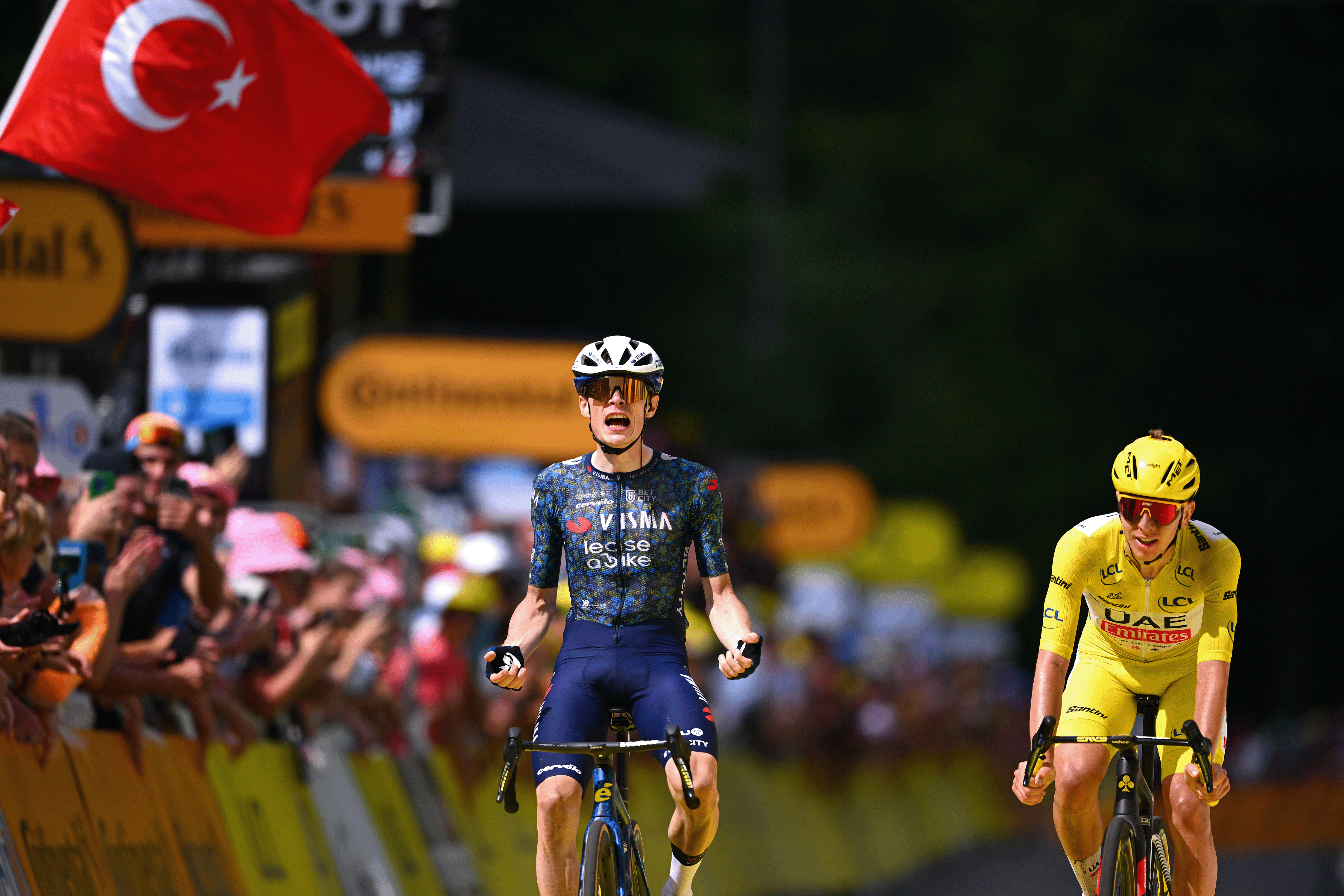
There are complacent voices who believe the Tour will be three weeks of boring non-competition, but why should Vingegaard's performance only point negatively towards a close-fought Tour? The gap, albeit Pogačar could've extended it, but still, was only 59 seconds, and it was Vingegaard's first race since he got concussed in March, whereas his rival has had a clean run in 2025.
Also, yes, Pogačar was superior at the Dauphiné, but the Dane has only beaten Pogačar in a one-week stage race once, with the pair finishing second and third respectively behind Primož Roglič at Itzulia Basque Country in 2021. Vingegaard came good in '22 and '23 after losing to Pogačar in Tirreno-Adriatico and Paris-Nice of those seasons – March is different to June, but the point remains.
The three-week tests, with longer stages and a greater accumulation of fatigue, are where Vingegaard and his team have found the way to defeat Pogačar, so what's to say they won't again? Team strength at the Dauphiné was a mixed bag for both, with Narváez's lead-out on stage 6 showing the best of UAE Team Emirates, but Sivakov being his only domestique one day later proved how he can get isolated.
Of course, neither had full-strength Tour teams on show, with Adam Yates and João Almeida still to enter Pogačar's arsenal, and Wout van Aert and Simon Yates ready to support Vingegaard after a successful Giro. But, even then, fortune at the Tour can run out very quickly and change the whole shape of a Grand Tour, with the crashes and chaos of the first week to avoid.
Dominance or not, Pogačar's presence makes cycling infinitely better. Even though he himself may be starting to feel the inequality of results take its toll, joking after a shock win on stage 1 of the Dauphiné, where the superstars came to the fore, "Don't worry, everybody, maybe I'll retire soon when my contract is finished".
That would be in 2030, and see him just into his 30s. I, for one, certainly want his time in the sport to go on longer, knowing full well he is the best I'll probably ever see. Hopefully, those who complain of his dominance now can appreciate it before he is gone, because the likes of what he's able to do is something we haven't seen for nigh-on 50 years.
Be it Pogačar or pole vault, sporting supremacy may not be your cup of tea, but seeing the absolute best of the best will always be what keeps me coming back. Bring on July 5, and bring on the Tour de France.
Get unlimited access to all of our coverage of the Tour de France - including breaking news and analysis reported by our journalists on the ground from every stage of the race as it happens and more. Find out more.

James Moultrie is a gold-standard NCTJ journalist who joined Cyclingnews as a News Writer in 2023 after originally contributing as a freelancer for eight months, during which time he also wrote for Eurosport, Rouleur and Cycling Weekly. Prior to joining the team he reported on races such as Paris-Roubaix and the Giro d’Italia Donne for Eurosport and has interviewed some of the sport’s top riders in Chloé Dygert, Lizzie Deignan and Wout van Aert. Outside of cycling, he spends the majority of his time watching other sports – rugby, football, cricket, and American Football to name a few.
You must confirm your public display name before commenting
Please logout and then login again, you will then be prompted to enter your display name.
